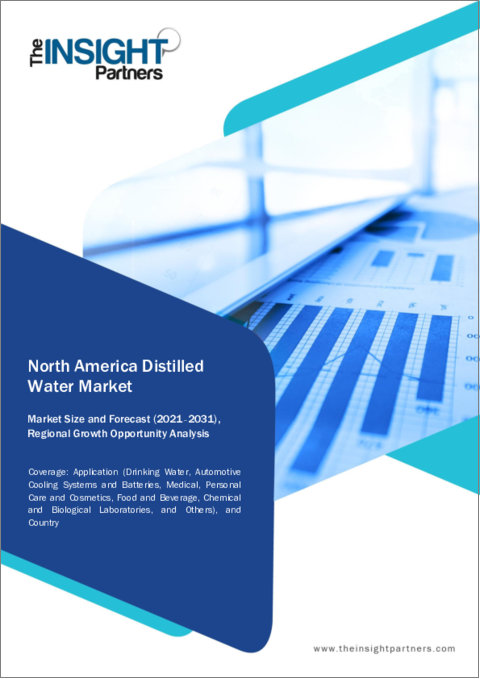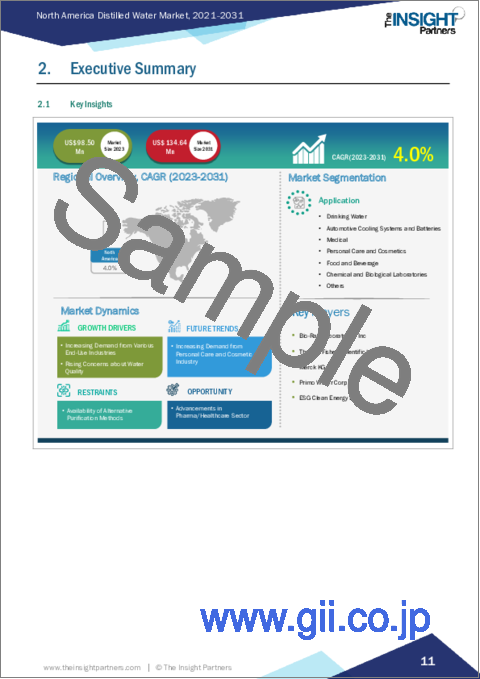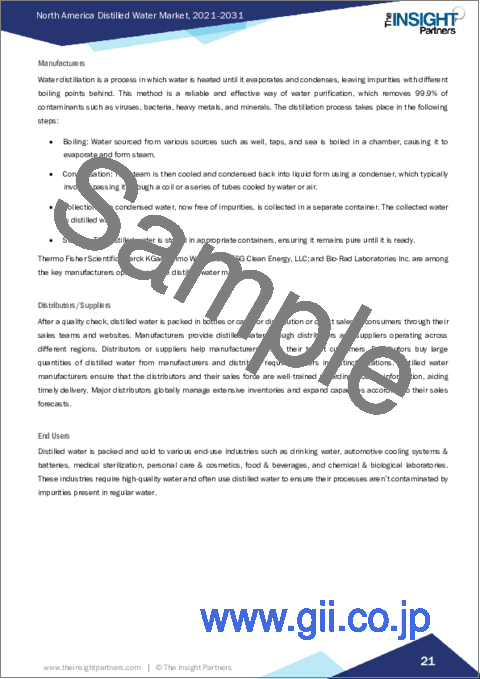|
|
市場調査レポート
商品コード
1498575
北米の蒸留水の市場規模および予測地域シェア、動向、成長機会分析レポート:用途別、国別North America Distilled Water Market Size and Forecast Regional Share, Trend, and Growth Opportunity Analysis Report Coverage: by Application and Country |
||||||
|
|||||||
| 北米の蒸留水の市場規模および予測地域シェア、動向、成長機会分析レポート:用途別、国別 |
|
出版日: 2024年05月27日
発行: The Insight Partners
ページ情報: 英文 72 Pages
納期: 即納可能
|
全表示
- 概要
- 図表
- 目次
北米の蒸留水市場は2023年の9,850万米ドルから2031年には1億3,464万米ドルに成長すると予測されています。2023年から2031年までのCAGRは4.0%で成長する見込みです。
蒸留水は、飲料水、自動車冷却システム&バッテリー、医療殺菌、パーソナルケア&化粧品、飲食品、化学&生物学研究所など、様々な最終用途産業向けに充填・販売されています。これらの産業は高品質の水を必要とし、通常の水に含まれる不純物によってプロセスが汚染されないようにするために蒸留水を使用することが多いです。
用途別では、飲料水、自動車冷却システムとバッテリー、医療、パーソナルケアと化粧品、飲食品、化学・生物学研究所、その他。2023年には、医療分野が大きな市場シェアを占め、パーソナルケアと化粧品が予測期間中に最も急成長する分野となる見込みです。蒸留水は、バクテリアの繁殖を防ぐため、持続気道陽圧装置に応用されています。さらに、蒸留水は創傷の洗浄や応急処置など様々な処置に使用されます。このように、医療分野における蒸留水の幅広い用途と医療業界の力強い成長が蒸留水の需要を牽引しています。
化粧品には汚染物質、微生物、毒素のない水が必要です。この前提条件は、様々な化粧品処方において蒸留水によって満たされています。スキンケア製品(化粧水、フェイシャルミスト、クレンジングなど)やメーキャップ製品(口紅、リキッドアイライナー、ファンデーションなど)には、蒸留水が基本成分として含まれています。食品業界では、非蒸留水に含まれる塩分やミネラルがさまざまな食品の風味を変えることがあるため、さまざまな食品を作るために蒸留水が使用されます。蒸留水はまた、食品の風味が変わらないようにするための缶詰工程でも使用されます。
蒸留水は、ミネラルの沈着が腐食や蓄積を引き起こし、動作に支障をきたす装置(自動車の冷却システムや鉛蓄電池など)に使用されます。水道水をバッテリーに使用するとミネラルが残留し、やがて蓄積してバッテリーの機能に影響を及ぼします。そのため、自動車のラジエーターに使用される冷却水の希釈には蒸留水が使用されます。世界保健機関(WHO)の1980年のガイドラインによると、蒸留水は人間が飲んでも安全です。蒸留水には毒素、化学物質、ウィルス、バクテリアは含まれていないです。蒸留水は最も純粋な水のひとつであり、他の種類の水に見られるさまざまな汚染物質を含んでいません。市場で事業を展開する様々な企業が、様々な第三者水試験施設によって試験された飲料用の蒸留水を提供しています。化学研究所や生物学研究所では、蒸留水は主に実験用試薬、緩衝液、溶液の調合に使用されます。また、試験後のガラス器具の洗浄にも使用されます。
米国における蒸留水の需要は、消費者行動の変化やヘルスケア、製造、食品加工など様々な産業からの需要の高まりにより急増すると予想されています。医薬品製造では、蒸留水は医薬品や医療溶液の調合に使用される重要な成分であり、最高水準の純度を維持することが最も重要です。同様に、飲食品業界では、味の一貫性と製品の安全性を確保するために水質が重要な特定の製品の製造に蒸留水が利用されています。これらの産業が米国で拡大し進化し続けるにつれて、蒸留水の需要は急増すると予想されます。
持続可能性と環境に対する意識の高まりは、使い捨てのペットボトル入りの水に代わる環境に優しい水として、個人を蒸留水へと向かわせる。家庭用蒸留システムに投資したり、蒸留水を大量に購入することで、消費者はプラスチック包装への依存を減らすことができ、より持続可能な水の消費パターンに貢献することができます。さらに、蒸留水宅配サービスの利便性と様々な小売店での入手可能性により、より多くの人々が蒸留水にアクセスしやすくなり、需要をさらに促進しています。
水質汚染やインフラ問題に対する懸念の高まりにより、飲料水や調理用の水道水に代わるものを求めるニーズが急増しています。水系感染症が増加し、水処理施設が不十分な地域もあることから、不純物や汚染物質のない蒸留水を求める消費者が増えています。この動向は、特に清潔な飲料水へのアクセスが困難な都市部において、家庭が水蒸留システムに投資したり、ボトル入りの蒸留水を購入することを促しています。
Bio-Rad Laboratories Inc、ESG Clean Energy LLC、Thermo Fisher Scientific Inc、Merck KGaA、Primo Water Corp、Boston BioProducts、Snugell LLC、Misty Mountain Spring Water LLC、MACHEREY-NAGEL GmbH &Co KG、Hayden Water Coなどが北米の蒸留水市場の大手企業です。これらの企業は、地理的プレゼンスと消費者基盤を拡大するためにM&Aや製品発売を採用しています。
北米の蒸留水市場全体の規模は、一次情報と二次情報の両方を用いて導き出されたものです。調査プロセスを開始するにあたり、市場に関する質的・量的情報を入手するため、社内外の情報源を用いて徹底的な二次調査を実施しました。また、データを検証し、より分析的な洞察を得るために、業界関係者との複数の一次インタビューを実施しました。このプロセスの参入企業には、北米の蒸留水市場を専門とするバイスプレジデント、事業開発マネージャー、マーケットインテリジェンスマネージャー、国内営業マネージャーなどの業界専門家や、バリュエーションの専門家、調査アナリスト、キーオピニオンリーダーなどの外部コンサルタントが含まれています。
目次
第1章 イントロダクション
第2章 エグゼクティブサマリー
- 主要洞察
- 市場の魅力
第3章 調査手法
- 2次調査
- 1次調査
- 仮説の策定
- マクロ経済要因分析
- 基礎数値の作成
- データの三角測量
- 国レベルのデータ
第4章 北米の蒸留水市場情勢
- 概要
- ポーターのファイブフォース分析
- 供給企業の交渉力
- 買い手の交渉力
- 新規参入業者の脅威
- 競争企業間の敵対関係
- 代替品の脅威
- エコシステム分析
- バリューチェーンのベンダー一覧
第5章 北米の蒸留水市場-主要市場力学
- 北米の蒸留水市場- 主要市場力学
- 市場促進要因
- 様々な最終用途産業からの需要の増加
- 水質に対する懸念の高まり
- 市場抑制要因
- 代替精製方法の利用可能性
- 機会
- 製薬/ヘルスケア分野の進歩
- 今後の動向
- パーソナルケアと化粧品業界からの需要の増加
第6章 北米の蒸留水市場分析
- 北米の蒸留水市場収益、2021-2031年
- 北米の蒸留水市場予測と分析
第7章 北米の蒸留水市場分析:用途別
- 飲料水
- 自動車冷却システムとバッテリー
- 医療用
- パーソナルケアと化粧品
- 飲食品。
- 化学・生物学研究所
- その他
第8章 北米の蒸留水市場:国別分析
- 北米
- 米国
- カナダ
- メキシコ
第9章 競合情勢
- 主要プレーヤーによるヒートマップ分析
- 企業のポジショニングと集中度
第10章 業界情勢
- 概要
- 市場イニシアティブ
- 新製品開発
第11章 企業プロファイル
- Bio-Rad Laboratories Inc.
- ESG Clean Energy, LLC.
- Thermo Fisher Scientific Inc.
- Merck KGaA.
- Primo Water Corp.
- Boston BioProducts.
- Snugell LLC.
- Misty Mountain Spring Water LLC.
- MACHEREY-NAGEL GmbH & Co. KG.
- Hayden Water Co.
第12章 付録
List Of Tables
- Table 1. North America Distilled Water Market Segmentation. 10
- Table 2. North America Distilled Water Market - Revenue and Forecast to 2031 (US$ Million) 27
- Table 3. North America Distilled Water Market - Revenue and Forecast to 2031 (US$ Million) - by Application. 28
- Table 4. North America Distilled Water Market - Revenue and Forecast to 2031 (US$ Million) - by Country. 36
- Table 5. United States: North America Distilled Water Market - Revenue and Forecast to 2031 (US$ Million) - by Application. 38
- Table 6. Canada: North America Distilled Water Market - Revenue and Forecast to 2031 (US$ Million) - by Application. 39
- Table 7. Mexico: North America Distilled Water Market - Revenue and Forecast to 2031 (US$ Million) - by Application. 41
List Of Figures
- Figure 1. North America Distilled Water Market Segmentation, by Country. 10
- Figure 2. North America Distilled Water Market - Porter's Five Forces Analysis. 18
- Figure 3. Ecosystem Analysis: North America Distilled Water Market 20
- Figure 4. North America Distilled Water Market Impact Analysis of Drivers and Restraints. 26
- Figure 5. North America Distilled Water Market Revenue (US$ Million), 2021-2031. 27
- Figure 6. North America Distilled Water Market Share (%) - by Application, 2023 and 2031. 28
- Figure 7. Drinking Water: North America Distilled Water Market- Revenue and Forecast to 2031 (US$ Million) 29
- Figure 8. Automotive Cooling Systems and Batteries: North America Distilled Water Market- Revenue and Forecast to 2031 (US$ Million) 30
- Figure 9. Medical: North America Distilled Water Market- Revenue and Forecast to 2031 (US$ Million) 31
- Figure 10. Personal Care and Cosmetics: North America Distilled Water Market- Revenue and Forecast to 2031 (US$ Million) 32
- Figure 11. Food and Beverage: North America Distilled Water Market- Revenue and Forecast to 2031 (US$ Million) 33
- Figure 12. Chemical and Biological Laboratories: North America Distilled Water Market- Revenue and Forecast to 2031 (US$ Million) 34
- Figure 13. Others: North America Distilled Water Market- Revenue and Forecast to 2031 (US$ Million) 35
- Figure 14. North America Distilled Water Market Breakdown by Key Countries, 2023 and 2031 (%) 36
- Figure 15. United States: North America Distilled Water Market - Revenue and Forecast to 2031 (US$ Million) 37
- Figure 16. Canada: North America Distilled Water Market - Revenue and Forecast to 2031 (US$ Million) 39
- Figure 17. Mexico: North America Distilled Water Market - Revenue and Forecast to 2031 (US$ Million) 40
- Figure 18. Heat Map Analysis by Key Players. 42
- Figure 19. Company Positioning & Concentrations. 42
North America distilled water market is expected to grow from US$ 98.50 million in 2023 to US$ 134.64 million by 2031. It is expected to grow at a CAGR of 4.0% from 2023 to 2031.
Distilled water is packed and sold to various end-use industries such as drinking water, automotive cooling systems & batteries, medical sterilization, personal care & cosmetics, food & beverages, and chemical & biological laboratories. These industries require high-quality water and often use distilled water to ensure their processes aren't contaminated by impurities present in regular water.
Based on application into drinking water, automotive cooling systems and batteries, medical, personal care and cosmetics, food and beverage, chemical and biological laboratories, and others. In 2023, medical segment held a significant market share, and personal care and cosmetics is expected to be the fastest-growing segment during the forecast period. Distilled water finds application in continuous positive airway pressure machines, as it prevents bacteria from breeding. In addition, distilled water is used for various procedures such as wound cleansing and first aid. Thus, the wide applications of distilled water in the medical field and the strong growth of the medical industry drive the demand for distilled water.
Cosmetic products require water that is free from pollutants, microbes, and toxins. This prerequisite is fulfilled by distilled water in various cosmetic formulations. Skincare products (such as toners, facial mists, and cleansers) and makeup products (including lipsticks, liquid eyeliners, and foundations) contain distilled water as a fundamental ingredient. In the food industry, distilled water is used to make different food products, as salts and minerals in non-distilled water types can alter the flavors of different food products. Distilled water is also used in the canning process to ensure the food's flavor remains the same.
Distilled water is used in devices (such as automotive cooling systems and lead-acid batteries) where mineral deposits can cause corrosion and build-up that interferes with operations. The use of tap water in batteries will leave behind minerals, which would eventually accumulate and affect the functioning of the battery. Therefore, distilled water is used for diluting the coolant used in the radiator of vehicles. According to the 1980 guidelines by the World Health Organization (WHO), distilled water is safe for human consumption. Distilled water is free from toxins, chemicals, viruses, and bacteria. It is one of the purest forms of water, free from different contaminants found in other types of water. Various players operating in the market offer distilled water for drinking that is tested by various third-party water-testing facilities. In chemical and biological laboratories, distilled water is predominantly used in the formulation of laboratory reagents, buffers, and solutions. It is also used to clean laboratory glassware after performing tests.
The demand for distilled water in the US is expected to surge owing to the shifting consumer behavior and rising demand from various industries such as healthcare, manufacturing, and food processing. In pharmaceutical production, distilled water is a critical ingredient used for the formulation of drugs and medical solutions, where maintaining the highest standards of purity is paramount. Similarly, in the food & beverages industry, distilled water is utilized in producing certain products where water quality is crucial to ensure taste consistency and product safety. As these industries continue to expand and evolve in the US, the demand for distilled water is expected to surge.
The increasing focus on sustainability and environmental consciousness has encouraged individuals to turn to distilled water as it is an eco-friendly alternative to single-use plastic bottled water. By investing in home distillation systems or purchasing distilled water in bulk, consumers can reduce their reliance on plastic packaging, thus contributing to a more sustainable water consumption pattern. Moreover, the convenience of distilled water delivery services and its availability in various retail outlets make it more accessible to a broader audience, further propelling the demand.
Growing concerns over water contamination and infrastructure issues have surged the need to seek alternatives for tap water for drinking and cooking. With the increasing number of waterborne diseases and inadequate water treatment facilities in a few regions, consumers are increasingly turning to distilled water as it is free from impurities and contaminants. This trend has encouraged households to invest in water distillation systems or purchase bottled distilled water, particularly in urban areas where access to clean drinking water is challenging.
Bio-Rad Laboratories Inc, ESG Clean Energy LLC, Thermo Fisher Scientific Inc, Merck KGaA, Primo Water Corp, Boston BioProducts, Snugell LLC, Misty Mountain Spring Water LLC, MACHEREY-NAGEL GmbH & Co KG, and Hayden Water Co, are among the leading players in the North America distilled water market. These companies are adopting mergers & acquisitions and product launches to expand their geographic presence and consumer bases.
The overall North America distilled water market size has been derived using both primary and secondary sources. To begin the research process, exhaustive secondary research has been conducted using internal and external sources to obtain qualitative and quantitative information related to the market. Also, multiple primary interviews have been conducted with industry participants to validate the data and gain more analytical insights. Participants of this process include industry experts such as VPs, business development managers, market intelligence managers, and national sales managers-along with external consultants, including valuation experts, research analysts, and key opinion leaders-specializing in the North America distilled water market.
Table Of Contents
1. Introduction
- 1.1 The Insight Partners Research Report Guidance.
- 1.2 Market Segmentation
2. Executive Summary
- 2.1 Key Insights
- 2.2 Market Attractiveness
3. Research Methodology
- 3.1 Secondary Research
- 3.2 Primary Research
- 3.2.1 Hypothesis formulation:
- 3.2.2 Macro-economic factor analysis:
- 3.2.3 Developing base number:
- 3.2.4 Data Triangulation:
- 3.2.5 Country level data:
4. North America Distilled Water Market Landscape
- 4.1 Overview.
- 4.2 Porter's Five Forces Analysis.
- 4.2.1 Bargaining Power of Suppliers.
- 4.2.2 Bargaining Power of Buyers.
- 4.2.3 Threat of New Entrants.
- 4.2.4 Intensity of Competitive Rivalry.
- 4.2.5 Threat of Substitutes.
- 4.3 Ecosystem Analysis.
- 4.3.1 List of Vendors in Value Chain.
5. North America Distilled Water Market - Key Market Dynamics
- 5.1 North America Distilled Water Market - Key Market Dynamics.
- 5.2 Market Drivers.
- 5.2.1 Increasing Demand from Various End-Use Industries.
- 5.2.2 Rising Concerns about Water Quality.
- 5.3 Market Restraints.
- 5.3.1 Availability of Alternative Purification Methods.
- 5.4 Opportunities.
- 5.4.1 Advancements in Pharma/Healthcare Sector
- 5.5 Future Trends.
- 5.5.1 Increasing Demand from Personal Care and Cosmetic Industry.
6. North America Distilled Water Market Analysis
- 6.1 North America Distilled Water Market Revenue (US$ Million), 2021-2031.
- 6.2 North America Distilled Water Market Forecast and Analysis.
7. North America Distilled Water Market Analysis - by Application
- 7.1 Drinking Water
- 7.1.1 Overview.
- 7.1.2 Drinking Water: North America Distilled Water Market - Revenue and Forecast to 2031 (US$ Million)
- 7.2 Automotive Cooling Systems and Batteries.
- 7.2.1 Overview.
- 7.2.2 Automotive Cooling Systems and Batteries: North America Distilled Water Market - Revenue and Forecast to 2031 (US$ Million)
- 7.3 Medical
- 7.3.1 Overview.
- 7.3.2 Medical: North America Distilled Water Market - Revenue and Forecast to 2031 (US$ Million)
- 7.4 Personal Care and Cosmetics.
- 7.4.1 Overview.
- 7.4.2 Personal Care and Cosmetics: North America Distilled Water Market - Revenue and Forecast to 2031 (US$ Million)
- 7.5 Food and Beverage.
- 7.5.1 Overview.
- 7.5.2 Food and Beverage: North America Distilled Water Market - Revenue and Forecast to 2031 (US$ Million)
- 7.6 Chemical and Biological Laboratories.
- 7.6.1 Overview.
- 7.6.2 Chemical and Biological Laboratories: North America Distilled Water Market - Revenue and Forecast to 2031 (US$ Million)
- 7.7 Others.
- 7.7.1 Overview.
- 7.7.2 Others: North America Distilled Water Market - Revenue and Forecast to 2031 (US$ Million)
8. North America Distilled Water Market - Country Analysis
- 8.1 North America.
- 8.1.1 North America Distilled Water Market Breakdown by Countries.
- 8.1.2 North America Distilled Water Market Revenue and Forecast and Analysis - by Country.
- 8.1.2.1 North America Distilled Water Market Revenue and Forecast and Analysis - by Country.
- 8.1.2.2 United States: North America Distilled Water Market - Revenue and Forecast to 2031 (US$ Million)
- 8.1.2.2.1 United States: North America Distilled Water Market Breakdown by Application.
- 8.1.2.3 Canada: North America Distilled Water Market - Revenue and Forecast to 2031 (US$ Million)
- 8.1.2.3.1 Canada: North America Distilled Water Market Breakdown by Application.
- 8.1.2.4 Mexico: North America Distilled Water Market - Revenue and Forecast to 2031 (US$ Million)
- 8.1.2.4.1 Mexico: North America Distilled Water Market Breakdown by Application.
9. Competitive Landscape
- 9.1 Heat Map Analysis by Key Players.
- 9.2 Company Positioning & Concentration.
10. Industry Landscape
- 10.1 Overview.
- 10.2 Market Initiative.
- 10.3 New Product Development
11. Company Profiles
- 11.1 Bio-Rad Laboratories Inc.
- 11.1.1 Key Facts.
- 11.1.2 Business Description.
- 11.1.3 Products and Services.
- 11.1.4 Financial Overview.
- 11.1.5 SWOT Analysis.
- 11.1.6 Key Developments.
- 11.2 ESG Clean Energy, LLC.
- 11.2.1 Key Facts.
- 11.2.2 Business Description.
- 11.2.3 Products and Services.
- 11.2.4 Financial Overview.
- 11.2.5 SWOT Analysis.
- 11.2.6 Key Developments.
- 11.3 Thermo Fisher Scientific Inc.
- 11.3.1 Key Facts.
- 11.3.2 Business Description.
- 11.3.3 Products and Services.
- 11.3.4 Financial Overview.
- 11.3.5 SWOT Analysis.
- 11.3.6 Key Developments.
- 11.4 Merck KGaA.
- 11.4.1 Key Facts.
- 11.4.2 Business Description.
- 11.4.3 Products and Services.
- 11.4.4 Financial Overview.
- 11.4.5 SWOT Analysis.
- 11.4.6 Key Developments.
- 11.5 Primo Water Corp.
- 11.5.1 Key Facts.
- 11.5.2 Business Description.
- 11.5.3 Products and Services.
- 11.5.4 Financial Overview.
- 11.5.5 SWOT Analysis.
- 11.5.6 Key Developments.
- 11.6 Boston BioProducts.
- 11.6.1 Key Facts.
- 11.6.2 Business Description.
- 11.6.3 Products and Services.
- 11.6.4 Financial Overview.
- 11.6.5 SWOT Analysis.
- 11.6.6 Key Developments.
- 11.7 Snugell LLC.
- 11.7.1 Key Facts.
- 11.7.2 Business Description.
- 11.7.3 Products and Services.
- 11.7.4 Financial Overview.
- 11.7.5 SWOT Analysis.
- 11.7.6 Key Developments.
- 11.8 Misty Mountain Spring Water LLC.
- 11.8.1 Key Facts.
- 11.8.2 Business Description.
- 11.8.3 Products and Services.
- 11.8.4 Financial Overview.
- 11.8.5 SWOT Analysis.
- 11.8.6 Key Developments.
- 11.9 MACHEREY-NAGEL GmbH & Co. KG.
- 11.9.1 Key Facts.
- 11.9.2 Business Description.
- 11.9.3 Products and Services.
- 11.9.4 Financial Overview.
- 11.9.5 SWOT Analysis.
- 11.9.6 Key Developments.
- 11.10 Hayden Water Co.
- 11.10.1 Key Facts.
- 11.10.2 Business Description.
- 11.10.3 Products and Services.
- 11.10.4 Financial Overview.
- 11.10.5 SWOT Analysis.
- 11.10.6 Key Developments.
12. Appendix
- 12.1 About The Insight Partners.






